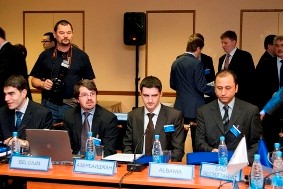-

12 November, 2010
Joint EAG/MONEYVAL typologies seminar was held in Moscow on November 9-10. It was dedicated to fighting cybercrime, countering criminal financial flows on the Internet and mitigating ML/TF risks through misuse of e-money and other new payment methods.
These issues are researched in the framework of joint typologies studies conducted by the EAG and MONEYVAl.
MONEYVAL Chairman Vladimir Nechaev believes that the results of the seminar would allow to devise recommendations for law-enforcement and supervisory agencies as well as financial institutions to enhance procedures for identifying suspicious transactions conducted with electronic technologies.
“The reports presented at the seminar clearly show that criminals all over the world are using a wide range of new Internet technologies, - said Mr. Nechaev. – There are no geographical borders for such crimes. For example online casinos which are illegal in many countries today could be based on Internet services located in those jurisdictions which legislation does not prohibit gambling. The EAG/MONEYVAL typologies seminar helps to summarize a very useful practical experience of a number of countries and suggest strategic priorities for international cooperation for AML/CFT”.
The participants of the seminar focused on the following key vulnerabilities of new payment methods and risks of their misuse for ML/TF:
- High speeds of electronic transactions;
- Possibilities to move large amounts of money anonymously and overseas;
- Lack of regulations of e-payments.
Enhancing regulation of e-money is one of priorities specified on the results of the seminar. Other recommendations focus on the necessity to enhance interagency cooperation of law-enforcement and supervisory bodies with Internet services providers and ensure more effective methods to identify customers and suspicious transactions conducted through e-payments.
In order to do so the experts recommend a number of measures including introduction of threshold amounts for e-transactions alongside special requirements to provision of information on payment details, submission of transaction data to FIUs, licensing e-money systems’ activities, etc.
Typologies research will proceed; their results will be published in full after approval of the EAG and MONEYVAl Plenary meetings in December.

 Login to your account
Login to your account Eng
Eng Рус
Рус